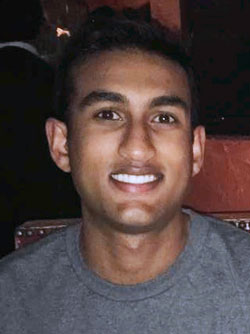Article
 Harsha NamburiHarsha Namburi is an undergraduate student majoring in honors integrative biology. Namburi's specific area of study is circadian neuroscience. He was awarded a 2020 Beckman Institute Undergraduate Fellowship.
Harsha NamburiHarsha Namburi is an undergraduate student majoring in honors integrative biology. Namburi's specific area of study is circadian neuroscience. He was awarded a 2020 Beckman Institute Undergraduate Fellowship.
He works in the Clockworks Lab with Professor Martha Gillette, Jennifer Mitchell, and Eman Hamed. He also collaborates with the Jonathan Sweedler Group.
Hometown: Vernon Hills, Illinois
What kind of research are you working on?
My research is on circadian rhythms and the glymphatic system, a waste clearance system in the brain responsible for preventing the development of diseases like Alzheimer's. I study how the body’s daily rhythms and the misalignment of these rhythms impact this system. At the moment, I am collaborating with the Sweedler Group to investigate the chemical profile of the glymphatic system under varying circadian rhythms.
Why is this important and why do you find it interesting?
Circadian rhythms and sleep are very important parts of health. We know now that even a flash of blue light in the middle of the night can misalign our circadian rhythms, leading to a day of lethargy. From my previous research and other studies, it is shown that misalignment of circadian rhythms has some very detrimental consequences. Bringing light to these consequences can hopefully convince society to prioritize this very important part of a person’s health. This is part of the reason that I find this so interesting. Circadian rhythms are so important to our short term and long term health; however, many institutions and parts of culture applaud behaviors associated with minimal sleep. Hopefully with science, we can start to make a change for the better.
How has your affiliation with the Beckman Institute helped you?
My affiliation with the Beckman Institute has given me great opportunities to continue my research. I am honored to be a 2020 Beckman Undergraduate Fellow. This award has allowed me to focus more of my time towards research and collaborate with the Sweedler Group. Collaboration has broadened my work and added great depth to my research. Interdisciplinary work is very important to advancing science, and the Beckman Institute has helped me contribute to this.
What are your career plans?
I plan on attending medical school in the future. My work at the Beckman, coursework, and extracurriculars has influenced my goal of becoming a neurologist.
What do you like to do outside of the classroom or lab?
I enjoy staying active. I often play tennis, golf, basketball, football, and a few other sports. My other extracurriculars involve volunteering and advising underclassmen. Besides that, I also enjoy watching tv and movies and cooking with my friends.
How did your work change during the stay-at-home order over COVID-19 concerns?
My work became remote. I was planning on continuing research in the lab, but I had to settle with writing and data analysis. I did what I could with my laptop. With comprehensive testing, I am now able to go into the lab and start working on experiments.
What has been the hardest adjustment for you during the pandemic?
The hardest adjustment has been limiting my contact with other people. I miss a lot of my friends who I have not been able to see because of the restrictions.
What has been a hidden benefit of the stay-at-home order?
Being at home all day has given me a lot of free time. I learned to cook and spent a lot of time with my family and roommates.
Beckman Institute for Advanced Science and Technology